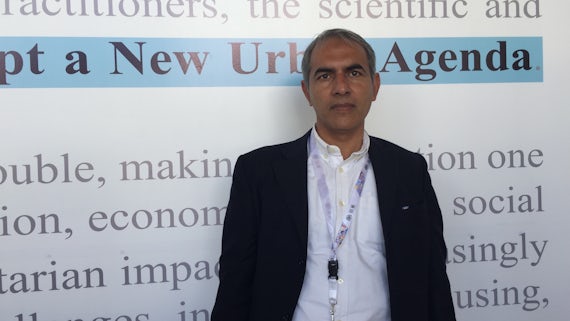Social Innovation, from minority sport to game changer
11 Tachwedd 2016

Research Fellow Dr Abid Mehmood delivered a keynote lecture at United Nations Habitat Conference on the importance of socially innovative initiatives as game changers for community development in different parts of the world.
Abid, Research Fellow at the Sustainable Places Research Institute has returned from the third United Nations Conference on Housing and Sustainable Urban Development (Habitat III) in Quito, Ecuador. Abid was a member of the Expert Panel for the parallel workshop ‘Community Development, Land Tenure and Social Innovation under Conditions of Rapid Urban Transformation’ at Pontificia Universidad Católica del Ecuador (PUCE).
He presented a keynote lecture ‘Social Innovation: From minority sport to game changer’. He also co-authored a paper with Dr Saeed Ahmed, NED University and Professor Alison Brown, Cardiff University looking at the role of social innovation towards provision of services and security of land tenure.
Speaking about the event Abid said: “It was a pleasure to present a keynote lecture on the importance of socially innovative initiatives as game changers for community development in different parts of the world. This draws on my own work on cities and sustainable places, helping to address specific urban issues and concerns related to sustainable place-making. It offers us cross cutting research opportunities to connect with work on future cities and place-based resilience.
“It also links into SUSPLACE, a Marie Curie Actions Initial Training Network funded by the European Commission, training Early Stage Researchers in innovative, interdisciplinary approaches to study Sustainable Place-shaping practices,” He continued.
The conference was the third in a series of global conferences held every 20 years to discuss and address the problems related to the future of global urbanisation. The event in Quito was attended by delegations from UN Member States around the world. It concluded with the adoption of the New Urban Agenda as a guidance for urban sustainability and governance for the next 20 years. The Agenda is particularly relevant to the Goal 11 ‘Sustainable Cities and Communities’ of the UN’s Sustainable Development Goals, and advocates an integrated approach to sustainable development in the urban and peri-urban areas around the world.”
